(MENAFN- Asia Times) On the tarmac of Samarkand Airport there's one lonely airplane: An Uzbek Airlines A-320 jet, in the green Uzbek livery, sits in front of the tiny terminal, baking in the scorching October sun.
From Moscow, it has bought over 100 Uzbek migrant workers back home, as well as a handful of Russian tourists eager to explore this ancient Silk Road city.
The terminal building is empty but for police and security staff. Awaiting relatives and friends, as well as cars and taxies, are all kept 700 meters away, behind stone walls. Access roads in from of the terminal are empty and off-limits.
Samarkand Airport's management is emblematic of old Uzbekistan, but this North Korea-like atmosphere is fading into history. After decades of the ruthless rule of Islam Karimov, the country is getting a long-awaited facelift.
Liberal reforms are being implemented – albeit slowly and cautiously. Uzbeks no longer need exit visas to travel abroad and foreigners from dozens of countries can now visit Uzbekistan visa-free. The currency was made fully convertible last year, and investment from countries including the United States and South Korea is impossible to miss.
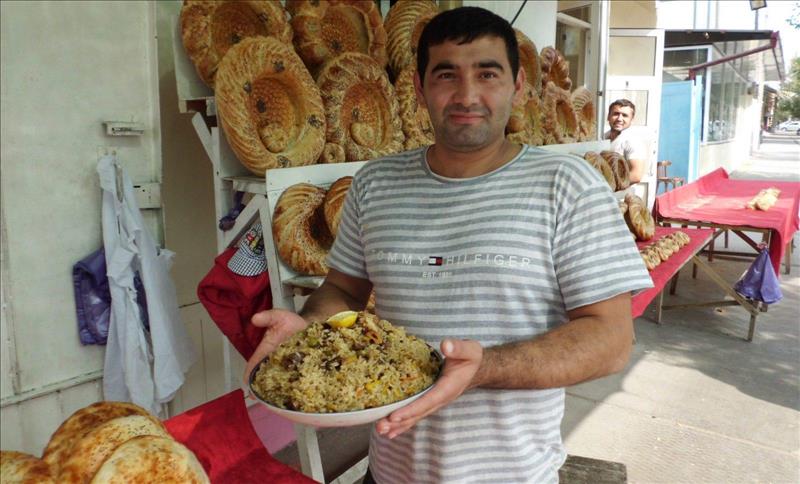
Uzbekistan, the most populous of the Central Asia ‘Stans, is open for business: A baker with local flat breads shows off a dish of pilaf. Photo: Alexander Kruglov Silk Road tourism Change is imminent at Samarkand Airport. A large-scale renovation is planned in anticipation of hordes of foreign tourists keen to visit this crown jewel of the Silk Road, with its spectacular architecture, exotic cuisine and welcoming natives.
In Samarkand's historic center, in front of the colorful medieval mosques and madrasseh on iconic Registan Square, the new openness is evident. Crowds of Japanese tourists obediently follow Japanese-speaking Uzbek tour guides, then come groups of Germans and Italians, all taking turns posing for selfies in front of the blue domes.
'We are so excited to be here, in this mysterious, ancient city,' Miyoko, a young Japanese student traveling to Bukhara and Samarkand with two friends, told Asia Times. 'I've always been dreaming of visiting these kinds of exotic Silk Road towns and oases.'
'Until last January, it was mission impossible to come here,' explains her friend Tomoko. 'Japanese needed a visa to enter this country, and it was really tough to get. This year, all visas were lifted… Japanese just love this place! Local cuisine, all those delicious watermelons and grapes, nuts, the old-style narrow alleys, blue domes and minarets – and especially, the hospitable people. '
'Many new Uzbekistan guidebooks were published this year in Japanese,' she gushed. 'You can find them everywhere in Tokyo!'
New luxury hotels and condos are sprouting up to service this rising wave of foreign tourists who are clearly enjoying the newly-discovered destination, as they indulge in atmospheric tea-houses selling hot flatbread and Uzbek tea.
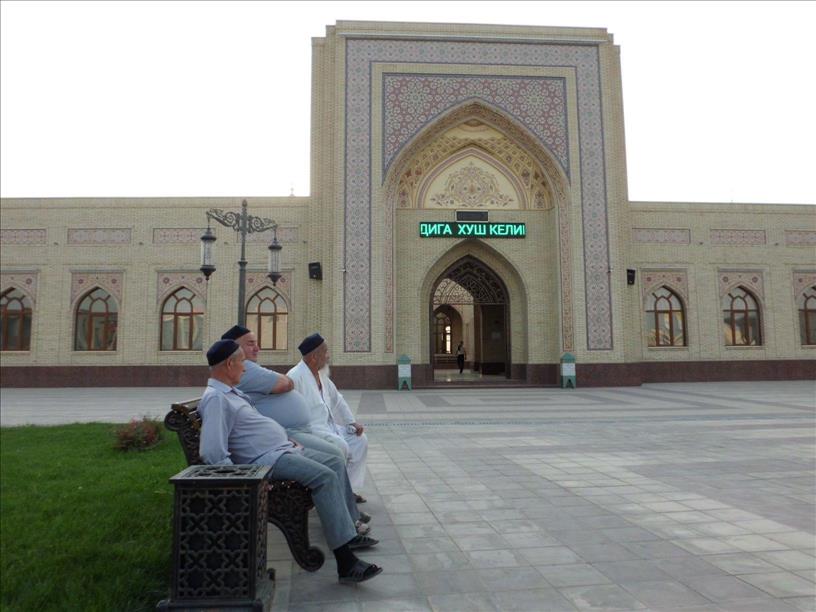
Locals lounge outside a mosque. Photo: Alexander Kruglov Out with the old… Uzbekistan, the most populous Central Asia nation of some 30 million citizens, has all the appearances of a country on the rise. Crowds of young people are everywhere; local families with children stroll the leafy streets and parks. The streets of downtown Samarkand and of the capital, Tashkent, swarm with Chevrolet cars – assembled by GM locally, in Andijan.
Many local and foreign observers attribute the upbeat new ambiance to Uzbek President Shavkat Mirziyoyev. He has shaken the country up and swept away many of the legacies of Karimov.
Since the collapse of the Soviet Union, the country had only had one ruler, until Karimov passed away in 2016. He was replaced by Shavkat Mirziyoyev, his longtime loyalist.
Mirziyoyev proved to be no Karimov #2. He swiftly announced reforms. Some Karimov opponents were released from prison, the defense and finance ministries were purged of Karimov loyalists and the once-mighty National Security Service has been restrained, and its leader, Rustam Inoyatov, fired.
Even so, many Uzbek and Russian experts believe Karimov's system still exists, under the surface, and Mirziyoyev is just leveraging reform to consolidate power.
'That's quite natural,' Rustam Dariyev, a political science professor a Tashkent National University, told Asia Times. 'Karimov was the founder of modern, independent Uzbekistan – the only leader the nation knew for 25 years! – while Mirziyoyev served as a Karimov's prime-minister for 17 years.'
'Mirziyoyev practiced the same kind of politics as Karimov, and shared [Karimov's] views on national security,' Dariyev continued. 'In the past, he opposed the liberal reforms that he now allegedly supports.'
Dariyev may be skeptical about the reforms, and Amnesty International has warned of ongoing human rights abuses. But there are many upbeat voices when it comes to trade and investment.

A new Islamic center under construction in Samarkand. Photo; Alexander Kruglov Trade and investment Central Asia was for centuries a region where competing powers overlapped and collided. Uzbekistan, at the center of the Silk Road, was traditionally a trading nation; even back in Soviet days, it boasted bustling bazaars and an abundance of food, while the national economy for decades rests on a solid base of natural resources including gold, oil and gas and especially cotton.
Tashkent has expanded trade ties with neighboring countries and more distant economies alike. It has reached out to Central Asian neighbors and been courted by Islamic nations – notably Iran, Saudi, Turkey and the UAE. However, Mirziyoyev has also improved ties with the West, and with Japan and South Korea. He has done all this while maintaining and expanding ties with traditional players Russia and China.
The aim is to diversify trade partners so as not to rely too heavily on any one country. But that's easier said than done. Trade figures show the balance is elusive: China accounts for nearly 19% of Uzbek trade; Russia nearly 18%; Kazakhstan roughly 8%; and Turkey some 6%.
In terms of global trade, Uzbekistan is still a newcomer – it's the 89th largest export economy in the world – and still suffers from a negative trade balance: In 2017, Uzbekistan exported $8.38 billion and imported $11.2 billion. But economic prospects are getting brighter, with the new-found openness under Mirziyoyev.
The auto sector showcases Uzbekistan's shifting commercial winds. In the 1990s, South Korea's Daewoo built the largest car plant in Central Asia, capturing virtually the entire market in Uzbekistan, supplying private vehicles and taxis. But when the over-ambitious Daewoo went bankrupt in the Asian financial crisis and was taken over by GM, the Uzbek Daewoo plant was acquired by the American giant. Now, virtually all cars in Uzbekistan bear the distinct Chevrolet logo.
Though the Koreans lost the car market, the best five-star hotel in Tashkent is now a Lotte, set in a newly elegant Stalin-era edifice. The local Russian-Korean community aggressively promotes Seoul-Tashkent ties.
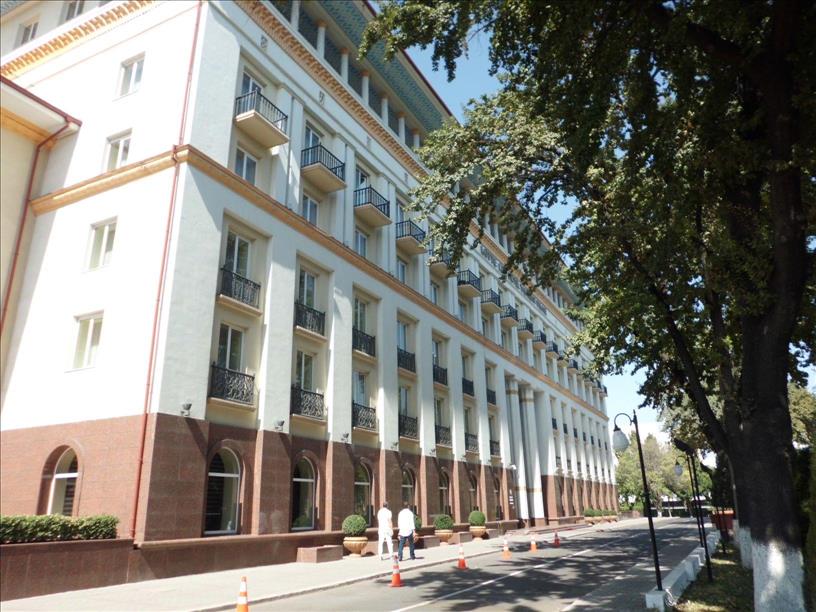
This Stalin-era building is now the site of a hotel run by the Japanese-Korean Lotte Group. Photo: Alexander KruglovTashkent has also invited high-profile Turkish investors. As a Turkic nation, Ankara considers Uzbeks their poorer siblings, so Turks are investing heavily.
And Mirziyoyev is flirting with the Americans, too. So far , Uzbekistan's trade with the US was only $315 million 2018, but last year Tashkent signed contracts with US companies worth $2.6 billion.
Even so, the real power remains Russia.
Brotherly ties After conquering Uzbekistan in the 19th century, Moscow set it on a completely different, secular path. Many Uzbeks believe that but for Russia/the USSR, Uzbekistan would now look like neighboring Afghanistan: ultra-conservative, war-town, unstable and poverty-wracked.
In this sense, Moscow's rule over Uzbekistan acted like Ataturk's in Turkey – forcibly thrusting the country into modernity, notably with secular governance and education. Uzbeks' positive attitude toward this de facto colonialism partly explains the lack of militant Islamicization in the country.
Karimov's foreign policy was erratic. He rebuked the West when he removed a US airbase, then rebuilt ties by refocusing trade and investment on partners from the democratic world, notably Japan, South Korea and the US. But relations soured in 2005 when Tashkent killed hundreds of protesters. The West condemned the government and imposed sanctions.
Since then, Uzbekistan has turned back to its traditional big brother. Moscow and Tashkent have agreed on large-scale joint projects worth more than $15 billion and trade is booming, with Russia being a major buyer of Uzbek agricultural products.
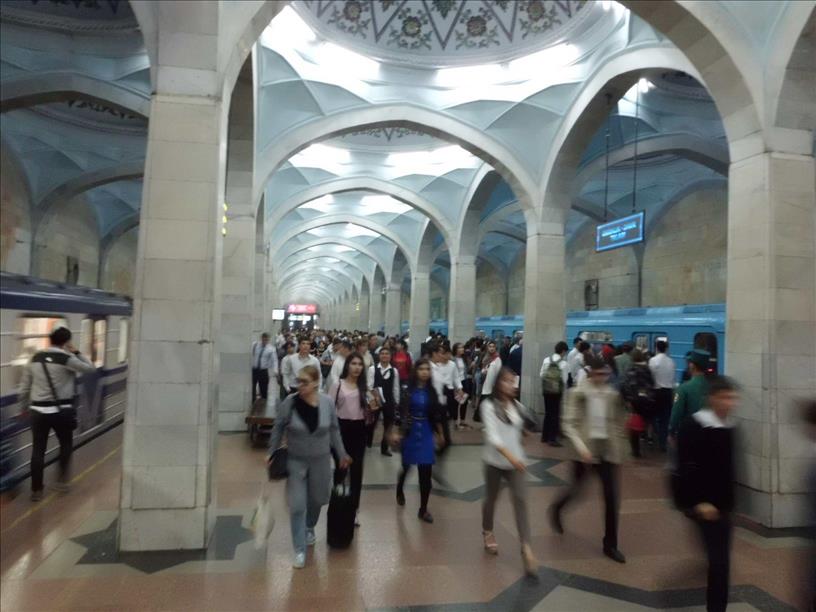
Tashkent metro, built by Moscow after an earthquake left the city in ruins in 1967. Though built in the monumental Soviet style, it also has an Uzbek/Islamic flourish. Photo: Alexander Kruglov'Russia has a strong advantage over any rivals in Uzbekistan and Central Asia due to its historical footprint and colonial legacy,' said Sergei Afanasyev, an ethnic Russian journalist and observer from Tashkent. 'Even now, almost 30 years into independence, everyone in Uzbekistan speaks Russian, even in small villages – from the local policeman to the delivery boy.'
Samarkand is a case in point. It's a true Central Asian city, complete with mosques and minarets, and a majority populace of Uzbeks and Tajiks. But just minutes' walk from the city's medieval Islamic districts, with their mazes of narrow sand and clay wall streets, is somewhere completely different.
Here lie broad leafy avenues with merchant houses and yellow-painted shopping rows from the 19th century, and Russian bookstores, movie theaters and Orthodox churches from the early 20th century. On Samarkand's outskirts, loom Soviet-built districts of look-alike high-rises and apartments. Most residents are Uzbeks, but they highly value these districts: housing prices are the highest in town.
With Russia and China competing for primacy in Central Asia, and emerging powers like Ergodan-era Turkey seeking a slice of the pie, Mirziyoyev is playing a balancing act.
At present, he seems to be playing it well. He is firmly in power and Uzbekistan is currently a stable and more-or-less neutral country executing a gradual opening that both foreign investors and tourists have long been awaiting.
In the second part of this series, Asia Times looks at the rising role of China in Central Asia.
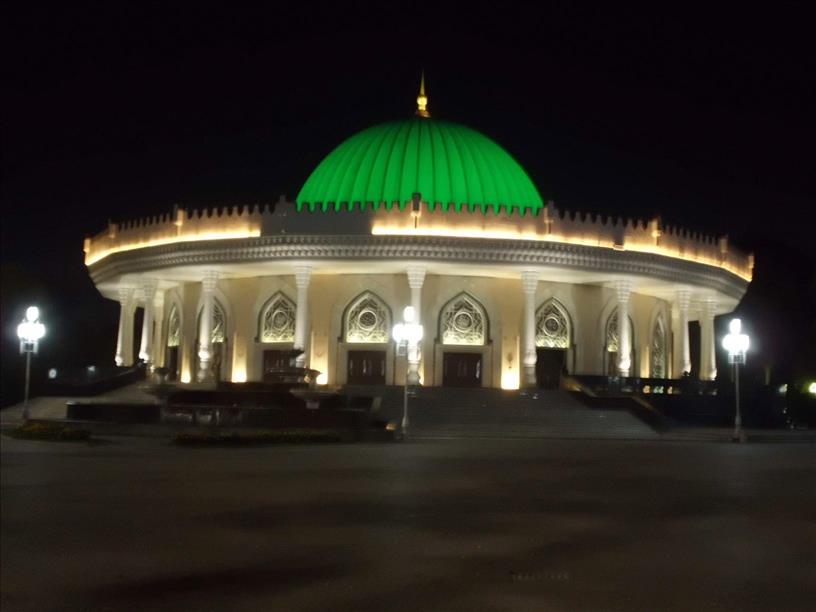
The mausoleum to the great conqueror, Timur the Great. Photo: Alexander KruglovMENAFN0211201901590000ID1099210605